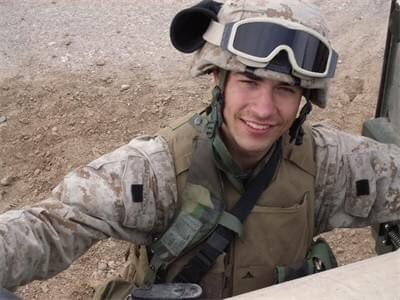Way before becoming the director of the Mississippi Justice Institute, Aaron Rice was a high school kid going through his morning routine when a group of 19 militants associated with the Islamic extremist group al Qaeda hijacked four airplanes.
Within two hours, 3,000 people would be dead and another 25,000 would be injured. 9/11 was the largest terrorist attack the world had ever seen. It was a devastating day for all Americans, but for some Americans, it inspired them to go to war against the evils of terrorism. Aaron Rice was one of those.
“September 11 [2001] happened my senior year of high school,” Rice said. “I decided right then and there that I was going to join the Marine Corps.”
Later that afternoon, Rice was at football practice when his friends started entertaining the question of what’s next for America. Rice turned to them and said four simple words.
“We’re going to war.”
Rice immediately went to the Military Entrance Processing Station in Jackson. His plan was to start serving right away, but unfortunately, an underlying health issue put a halt on the process.
“I went to get in right after 9/11 and was actually turned down, because I had a little problem in my ear,” Rice said. “I tried to get that fixed and went to my doctor to get a tube out of my ear, and he looked at it later and said, ‘if I don’t put this tube back in your ear, your eardrum is going to rupture.’”
For the time being, Rice had the tube put back into his ear and went off to Mississippi State University, where he spent a lot of time watching the news.
“I had to put that dream aside of joining the Marine Corps,” Rice said. “I enrolled in college, went to Mississippi State, and I was doing my freshman year there…I was glued to the news and watching the invasion of Iraq and seeing the casualties mount, and I just started being wrapped in guilt about it.”
Rice got up off the couch right then and there and went back to the doctor’s office to get the tube removed from his ear. After monitoring the situation closely, he re-signed up for the Marine Corps once his eardrum had healed without infection.
“I essentially tricked the Marine Corps into letting me in,” Rice said. “As soon as my eardrum healed and I didn’t have an ear infection, I ran and got let in before they could see the problems.”
By that time, Rice was 20 years old and heading to Paris Island, South Carolina for boot camp.
“I almost got kicked out as soon as I got there because they realized I still had this problem with my ear,” Rice said. “I begged the doctor when I got there to not kick me out…I had to just go through boot camp with pain and not be able to hear my drill instructor or sleep, but I made it.”
Boot camp concluded, and Rice returned to Mississippi State, where he could be both a reserve and a student. His second stint in Starkville would not last for long, though.
“My very first drill at my reserves unit, they said, ‘pack your bags boys. We’re going to Iraq,’” Rice said.
Within six months, Rice found himself in the middle of a desert, fighting for his country.
“It was a very intense situation,” Rice said. “You had to stay vigilant. A lot of the times, nothing was happening, but that could change at any moment. Our battalion came into a pretty heavily fought area. We actually wound up being the hardest hit battalion in the entire Iraq war.”
His battalion of 500 soldiers would suffer from 200 casualties, and unfortunately, Rice was one of them.
One day, Rice’s battalion went on a Personal Security Detail with their sergeant major and the executive officer. He was driving one of the vehicles and went slightly off the tracks. Within seconds, Rice was on the ground and could see his left leg underneath the vehicle.
“I was the only one who was injured, and that is one of the things I am eternally grateful for,” Rice said.
Soon thereafter, his platoon was once again targeted, taking the lives of four of Rice’s friends.
“Our platoon was ambushed after I was injured,” Rice said. “There were 16 men in the platoon. There was a car bomber that initiated it. A long firefight with heavy machine guns, so four of my friends died instantly in that car bomb. Five others were critically wounded in the firefight after.”
It is situations like those that reminds Rice what Memorial Day is all about.
“A lot of my very good friends paid the ultimate sacrifice and that is what Memorial Day is all about,” Rice said. “That’s one of the honors of my life, or the honor of my life, that I got to serve with those guys that were just true heroes.”
A fighter by nature, Rice only spent four days in the Intensive Care Unit. Upon his return to Jackson, he was awarded the Purple Heart. He, then, attained his law degree from Mississippi College before becoming the director of the Mississippi Justice Institute.








